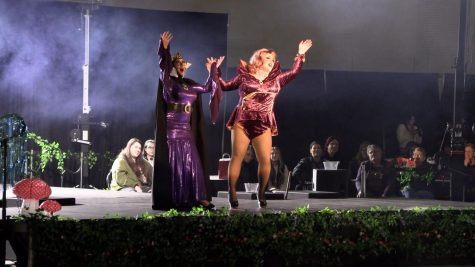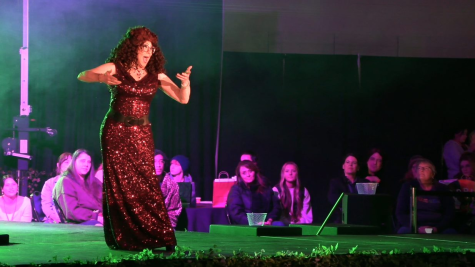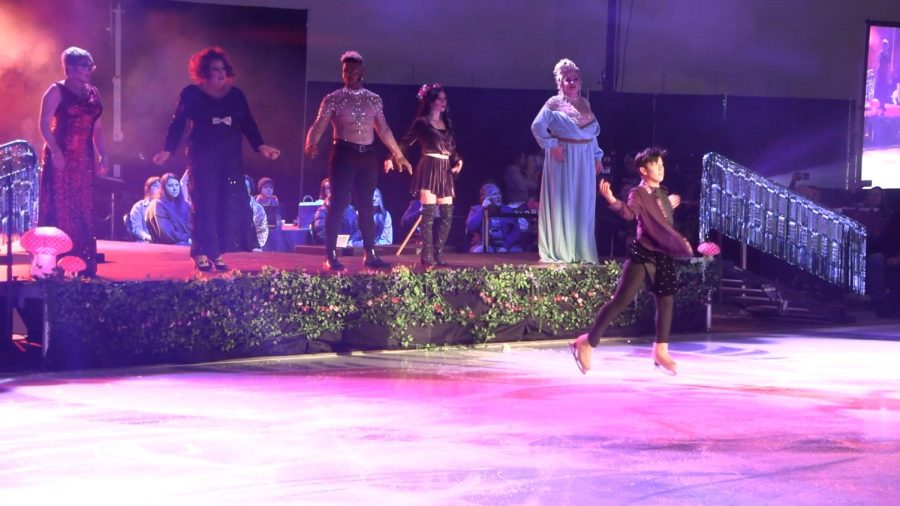EWU’s Drag on Ice Expands Tradition in the Midst of Recent Anti-Drag Legislation Across America
April 3, 2023
Cheers were off the charts. EWU’s Drag on Ice was a hit as tickets sold out quickly. Hundreds of people lined up at the doors to the University Recreation Center to grab seats for the annual drag show.
For the first time in its 26-year history of drag performances, Eastern Washington University held its annual Drag Show on ice. This event coincides with nationwide movements to criminalize drag performances in America.
Drag is a form of stylized entertainment often involving a performer (called a king or queen) performing with characteristics typical of the opposite sex. EWU has had a drag show every year since the late nineties, excluding 2020. This year is the third back after the pandemic and the first that has ever been held in the University Recreation Center ice rink with professional skaters.
The youngest skater, Henry Dingman, was only 16 years old at the time of the performance, which was his first professional show. Dingman said he was excited for the opportunity to perform here, having never performed outside his hometown in Idaho.
“I think this is all of our first time doing a drag-on-ice performance. In fact, we only know of one other show in San Francisco that has ever done drag on ice,” said Chris Anders, skater and choreographer.
According to Maggie Harty, Student Equity and Belonging Coordinator, EWU’s original drag show was held by a local fraternity as a joke in the nineties.
“It was very much like, ‘let’s make fun of [drag]’,” Harty said. “Before the Pride Center opened, Eagle Entertainment kind of took it away from the fraternity to turn it into what it is today, which is a celebration of the art form and an actual amazing event that is going towards helping queer organizations within the Spokane area.”

In recent years, the EWU Drag Show has taken on an educational role as well, according to Stacey Reece, director of student rights and responsibilities and previous director of student activities. There have been movie showings, history talks held by drag queens, and even DIY drag makeup events over the past few years.
Reece said that the largest recorded attendance for the EWU Drag Show was 790 people, which makes this the largest drag show in the area. National queens from the television series RuPaul’s Drag Race have come to perform in past years. This year audiences saw professional ice skaters in drag, many from Disney on Ice.
Recently, drag has been under attack by legislation across America. Many GOP-led states such as Tennessee, Idaho, and North Carolina have either proposed or passed recent anti-drag legislation restricting drag show performances in front of minors. Nationwide, 296 anti-LGBTQ bills have been filed, 26 of those originating in Tennessee and 25 from North Carolina.
Idaho, one of Washington’s neighboring states, has even considered banning public drag shows.
See statistics here.

The Spokane Aids Network (SAN) has been a long-time sponsor for the EWU drag show. Head of the organization, Grant Ogren, said that one of the most significant parts of the EWU drag show in the face of these threats is to show people that drag is a family-friendly event.
“To me, this brings to light that a college campus can have a drag show. Figure skaters can be part of it. The community can get behind it. And how is it bad? It’s fun. They’re not doing grooming – which, I hate that word. I mean, grooming should only be allowed in a barbershop. Nowhere else.” Ogren said.
Ogren said the recent legislation spreading across America banning drag shows in public spaces can harm organizations like SAN.
“It’s scaring a lot of people,” Ogren said. “Many feel like they can’t be themselves and they have to go back into the closet.”
Tennessee recently passed a bill restricting establishments from performing “adult cabaret performances” without a valid entertainer permit. The bill also “prohibits public, private, and commercial establishments from allowing persons under the age of 18 to attend a performance featuring adult cabaret entertainment,” according to the Tennessee General Assembly. Drag shows are included in the list of “adult cabaret performances” despite a vast majority of drag shows not being sexually oriented, said Ogren.
“I think it’s the lack of education [about the LGBTQ community] and the lack of people being aware which is one of the biggest issues,” Ogren said.
These anti-drag laws could create problems for several organizations like SAN as drag shows and other events fund nonprofit organizations that are important to the larger community. SAN helps those with HIV and the greater LGBTQ community in the Spokane region. They provide a food bank and necessary items (such as condoms and HIV testing) to those who are low-income downtown Spokane once a week. Four times a month, SAN offers a peer support group to those diagnosed with HIV as well.
“[Drag shows] fund non-profits in Arkansas, they fund them in Tennessee. Without these kinds of events, they’re all going to lose funding and there’s going to be bigger issues,” Ogren said.
Spokane Pride, who was also a sponsor for EWU’s Drag on Ice, developed a theme this year of “Never Going Back” to help validate those who are restricted from showing their identities because of this setback in LGBTQ progress.
Spokane Pride partnered with this year’s drag show to propel the relationship with Eastern forward and support the LGBTQ community in wider places other than strictly Spokane.
“When we were going through themes this year, we wanted to make sure that we were emphasizing our value,” said Esteban Herevia, CEO of Spokane Pride. “That extends to every single person within our community. This isn’t the time to go back.”
Spokane Pride hopes to be a refuge for those who are being discriminated against and can’t fully express themselves and their identities.
“We are building a structure that allows folks to know that we’re here for them,” Herevia said.
This legislation spreading across America has a possibility of reaching Washington state, and Herevia said it’s something to think about, considering Idaho’s talks of banning public drag shows.
“We can’t afford to be a whisper network,” Herevia said. “A big part of pride is maintaining that focus, that understanding that we’re here.”
Visit the Spokane Pride website here and Spokane Aids Network here.








